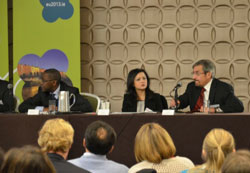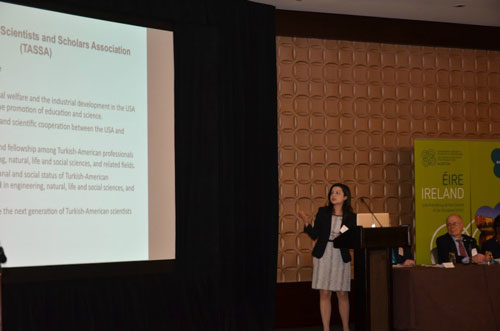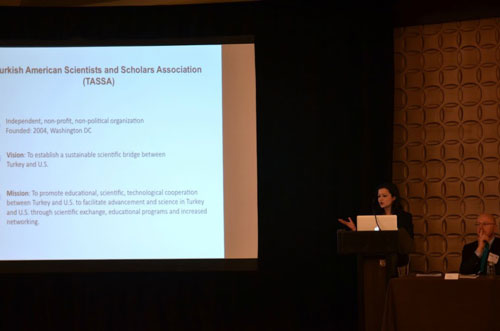TASSA is Invited to Science and Engineering Diaspora Event
 NODES (Networks of Diasporas for Science and Technology), a partnership between theDepartment of State, AAAS, and the National Academies, held a Science Diaspora Event in Boston on February 14, 2013. TASSA was invited and represented by Dr. Gizem Donmez, Assistant Professor at Tufts University delivered a presentation on TASSA at the event.
NODES (Networks of Diasporas for Science and Technology), a partnership between theDepartment of State, AAAS, and the National Academies, held a Science Diaspora Event in Boston on February 14, 2013. TASSA was invited and represented by Dr. Gizem Donmez, Assistant Professor at Tufts University delivered a presentation on TASSA at the event.
The NODES event included a panel discussion and breakout sessions. The panel was moderated by Dr. Mark Ferguson, Director General of Science Foundation Ireland and featured six panelists.
Dr. E. William Colglazier, Science and Technology Adviser to the U.S. Secretary of State, described NODES partnership and reviewed the scientific and economic benefits that U.S. received from foreign-born scientists and engineers. He mentioned that NODES will help to display the importance and great potential of such science networks for the U.S. and countries for diaspora communities.
Dr. Geneive Brown Metzger, Former Consul General of Jamaica in New York, described the efforts to connect scientists and engineers with Jamaican heritage to Jamaican individuals and institutions. She explained the efforts to attract investment into Jamaica and foster academic collaborations between U.S. and Jamaica.
Dr. Gizem Donmez, a member of the Turkish American Scientists and Scholars Association (TASSA), and a neuroscientist on the faculty of Tufts University School of Medicine, described how TASSA has established a vibrant scientific bridge between Turkey and the U.S. since its founding in 2004. TASSA’s mission is to promote educational, scientific, technological cooperation between Turkey and U.S. to facilitate advancement and science in Turkey and U.S. through scientific exchange, educational programs and increased networking. Dr. Donmez attested to TASSA’s positive impacts on her career, including raising her visibility and networking across U.S. and Turkish universities.
Dr. Nicholas Farrell, President of the Wild Geese Network of Irish Scientists (WGNIS), and Professor of Chemistry at Virginia Commonwealth University, described the experiences of the newly formed Irish science diaspora group. He also explained that WGNIS fosters international research collaboration and is being consulted by the press on Irish-U.S. science issues, and is being used to advertise science and technology related employment opportunities in the two countries.
Dr. Romain Murenzi, Executive Director of The World Academy of Science (TWAS) described how the formation of strong science networks could be bolstered by TWAS as it promotes excellence in research, strengthens South-South and South-North collaboration, addresses needs of young scientists, and disseminates scientific information.
Ambassador Daniel Hernández-Joseph, Mexico’s Consul General in Boston, described new developments in Mexico’s U.S. diaspora efforts. He described an increase in the number of immigrants in the U.S. with baccalaureate and graduate degrees. Mexico is using this educated diaspora to strengthen business, scientific and technological linkages.
The breakout sessions covered four different topics.
- The NODES Breakout Session on Institutional Partnerships explored how partnerships with scientific professional societies, Embassies, universities, academies of science, and science-related NGOs can help strengthen science diasporas.
- The NODES Breakout Session on Funding had a panel of representatives from the World Bank, Department of State, United States Agency of International Development (USAID), Seeding Labs, and the Indo-US Science and Technology Forum. They provided information on their organizations and programs that facilitate international scientific engagement that can be utilized by a wide-range of Diaspora communities.
- The NODES Session on Women in STEM Diaspora Networks assembled representatives from government agencies, academia, and nonprofit organizations to discuss challenges and opportunities for engaging women in STEM diaspora networks and provide concrete follow-on recommendations.
- The NODES Breakout Session on IT Platforms for Diaspora Engagement had a panel of representatives from the German Research Foundation the University of Pretoria, the South African National Research Foundation, and MIT. Each outlined their use of IT platforms and summarized their experiences with these technologies.
Dr. Donmez’s talk on TASSA gathered a lot of attention from the audience and the NODES. Apparently, TASSA is one of the best science diaspora existing in U.S. Its structure, its activities, its relation of both Turkish and U.S. government were praised and thought that it is the best example for the upcoming science diasporas.
Acknowledgements: This summary was prepared by the help of Elizabeth Lyons from NODES, Office of the Science and Technology Adviser to the Secretary. The photograph is a courtesy of Franklin Carrero-Martínez, AAAS Revelle Fellow.

